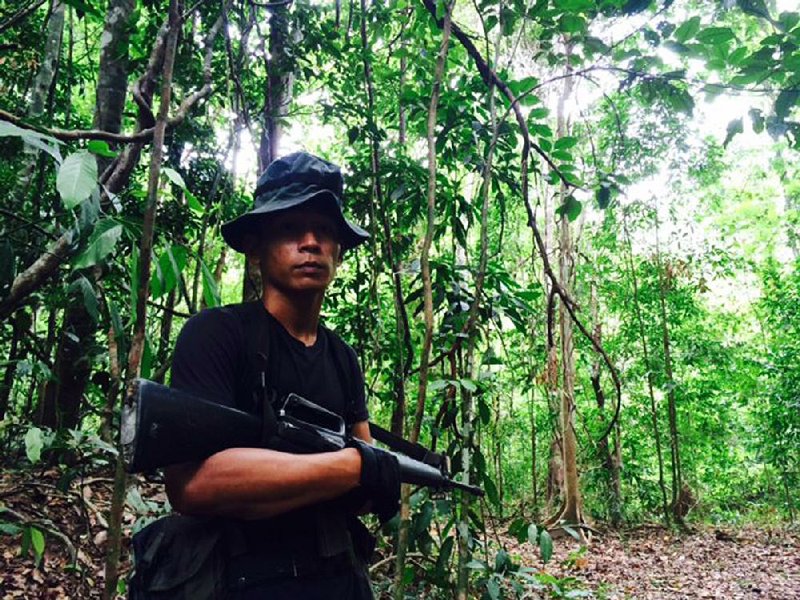BUKIT WANG BURMA, Malaysia -- Malaysian forensics teams exhumed a body from a shallow grave Tuesday at an abandoned jungle camp used by human traffickers, the first of what police predicted would be more grim findings as they search through a cluster of illicit hideouts near the border with Thailand.
Authorities say there are 139 suspected graves in the mountainous jungle where northern Malaysia meets southern Thailand, a remote area that trafficking syndicates used as a transit point to hold people. Most were believed to be members of Burma's persecuted Rohingya Muslim minority group and impoverished Bangladeshis.
"Forensics teams have found one human body so far," said Mohammad Bahar Alias, a senior police official from northern Perlis state.
Digging continued at other graves, which police said were marked by sticks or stones.
"There are graves all over this area," he said.
Malaysian police took journalists to one of 28 abandoned camps found after a regional crackdown was started on human trafficking earlier this month.
The camp appeared to have been abandoned a while ago, police said. A jungle prison remained that included at least two large wooden pens wrapped with barbed wire.
"These structures were believed to be used as human cages," Mohammad Bahar said.
He said the camp may have held up to 300 people. It also contained a watch tower and a cooking area littered with dishes and pots. During the tour, authorities pointed out what looked like the skeletal remains of a jaw on the ground.
"We think it belongs to a human," he said.
A tiny orange slipper was partly buried on a nearby slope, indicating that children were also held at the camp, he said. A suspected grave site was about 100 yards away.
The discoveries in Perlis follow similar revelations earlier this month in Thailand, where police unearthed dozens of bodies from shallow graves on the Thai side of the border. Thai police Maj. Gen. Puthichart Ekkachan said 36 bodies were found there in seven abandoned camps.
The discoveries have exposed hidden networks of jungle camps run by human smugglers, who have for years held countless people captive while extorting ransoms from their families. Most of the victims were part of a wave of people who fled their homelands to reach countries like Malaysia, where they hoped to find work or live freely.
Malaysian Home Minister Zahid Hamidi said police are probing the possibility that government officials, including some from the Forestry Department, may be involved in the human-trafficking syndicates.
He said several people have been detained and are under investigation but didn't provide further details.
As Southeast Asian governments have initiated crackdowns in recent weeks amid intensified international pressure and media scrutiny, traffickers have abandoned their camps and boats at sea to avoid arrest.
This month, more than 3,000 people -- about half of them from Bangladesh and half Rohingya from Burma -- have landed in Indonesia, Malaysia and Thailand, according to the U.N. refugee agency. Thousands more are believed to be trapped at sea in boats abandoned by their captains.
Human-rights groups and activists say the area along the Thai-Malaysia border has been used for years to smuggle people, including Rohingya Muslims, a long-persecuted minority group in predominantly Buddhist Burma.
In many cases, they pay human smugglers thousands of dollars for passage but are instead held for weeks or months while traffickers extort more money from their families back home. Rights groups say some have been beaten to death.
Malaysia and Indonesia announced last week that they would provide shelter for up to one year for people recently found or still stranded at sea. The U.S. has said it would consider settling some of them permanently.
For the rescue effort, the United States said it has begun military surveillance flights and is ready to conduct more as needed to help locate boats of people in the Andaman Sea and the Bay of Bengal. U.S. Navy P8 aircraft began flying over the weekend with Malaysian government support, State Department spokesman Jeff Rathke said.
Thailand on Tuesday joined Malaysia and Indonesia in launching naval patrols of its territorial waters, saying it will open a "floating base" near its maritime border with Burma where people in need of medical assistance can receive treatment at sea. The operation, which includes seven naval ships and eight aircraft for aerial searches, will run initially for two weeks, said Supreme Commander Gen. Worapong Sa-nganetr.
Burma is often called Myanmar, a name ruling military authorities adopted in 1989.
Information for this article was contributed by Jocelyn Gecker and Matthew Pennington of The Associated Press.
A Section on 05/27/2015

